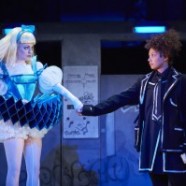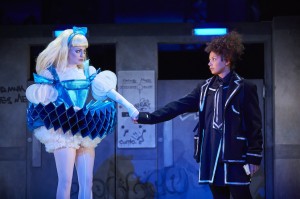Lois Chimimba: Alice in Wonderland for the digital age
Striking and engaging to watch, Lois Chimimba is currently starring as Aly, the teenager struggling to find herself, in Damon Albarn and Moira Buffini’s musical Wonder.land at the National Theatre. Inspired by Lewis Carroll’s literary classic Alice in Wonderland, the show reflects the digital era without ever appearing like a finger-wagging, cautionary tale. Lois stepped into The Rehearsal Room to talk diversity, not looking how she sounds and how rowdy teenagers made for one of the best audiences she’s ever had.
On being Scottish and mixed race
I’m not from an acting background, both my parents are engineers. I think I was about 15 when I said to my mum seriously that I’d like to do acting for the rest of my life and I got a relatively stern talking to about how unstable my life could be, I might never be able to buy a house… so I got all the warnings, and I still get the warnings, but they’re very much on my side.
I never thought about being mixed race when I was in Glasgow, because I sounded the same as everybody else. It was when I came to London that I became aware of it myself because there are a far wider range of cultures and races in London than Glasgow, so my eyes were opened a bit. But I became particularly aware of it at drama school – I was reading more plays and it’s quite rare that a character is described as mixed-race and very, very rarely as mixed race and Scottish (laughs). I came to realise it would either work in my advantage that I would be different to a lot of other people, or to my advantage that I don’t necessarily sound how I look. So far, any theatre I’ve done, I’ve been asked to do another accent, whereas the tv I’ve done has been in my own accent.
On arts funding: “Minorities and the working class…don’t even have the dreams any more, because there’s no way for them to fulfil them.”
On the issue of lack of diversity in acting
It’s an issue that seems to be backed by not only those in the industry from ethnic minorities, but also from white, middle class backgrounds – they support the cause as well – but it’s a difficult one, I feel that it’s chicken and egg; where does the movement need to start first? When I was in drama school, I was one of two mixed race people in a class of thirty, and there were three Black students, and that was the only ethnicities we had. So when people are graduating, what casting directors have to pick from is a far larger majority of white actors than anything else – but also drama schools are taking in less people from different backgrounds because they know there are less plays that have parts for them. So it’s almost like writers need to write more diverse things, but then they need the actors…it’s sort of who has to move first for us to all work together?
At drama school, in my year there wasn’t a single Asian person, or the year above and I don’t think the year below either, isn’t that shocking? It’s so difficult now that drama school fees are increasing every year. When I was at drama school, you had the Dance and Drama awards, which took my fees down from something like £13k a year to something like £1100 – I wouldn’t have been able to go if I didn’t have that. In my year there was something like eight to fifteen of these awards; a lot of people had them. But the year I was leaving, only two or three had them, because I guess arts funding was cut so badly. If you don’t have a family to support whatever industry dream you might have it can be really difficult – I think that’s what closes of minorities and working class more. People don’t even have the dreams any more, because there’s no way for them to fulfil them.
On her own writing
I have three close friends that I try to write with. We write mostly comedy and we’ve been trying to work on a tv idea that’s about young women. America has Girls and in our culture we’ve got things like The Inbetweeners – it’s always about young boys and they might behave badly or have romances, but we don’t see so much about young women I don’t think.
On the highlights of Wonder.land
We had a matinée on the day of our press night… Bloomberg brought out the whole theatre and gave all the tickets to children in schools local to the National. I’ve been doing shows since I was eleven, and I’ve never had a reaction like that…they were 15/16 years old and had absolutely no sensor – I wonder as adults exactly when we develop that, that shutting yourself up mode. But with these teenagers anything they thought, they vocalised. At first it was a bit of a shock but it made you feel everything so much more as the character – sometimes when its an issue that is important for kids or teens adults audiences don’t care or don’t connect with it, but teenagers are feeling every moment with you. It highlighted the peaks and troughs that are meant to be there that we maybe didn’t realise with an audience of grown ups. At the end, they cheered so loudly for us that we wanted to give them a cheer back – they should tour as an audience! Actors should get to see how lovely it is to have an audience so much on your side.
On what’s next
Wonder.land runs to the end of April and then it goes to Paris for a couple of weeks in June. I’m about to workshop a play with Out of Joint – I have a great relationship with Max Stafford-Clark, he gave me my first professional role – and actually for the first time for me in theatre, it’s a Scottish part!
Wonder.land runs until April 30th at the National Theatre www.wonder.land








Nice interview, Lois, though check out Drifters on E4/All 4. A British comedy drama show all about young women!